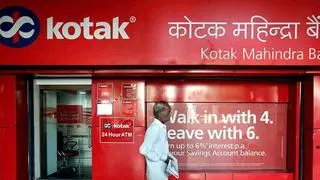Fitch Ratings expects the Indian banking sector’s near-term financial performance to improve gradually amid the economic momentum and regulatory forbearance on pandemic-led stress.
The global rating agency assessed that private banks would lead the recovery with faster loan growth than state banks, which may find it difficult to remain competitive without adequate growth capital.
The agency noted that a stronger economy and extended government relief should also boost Indian non-bank financial institutions’ (NBFI) performance. Still, asset-quality risks persist, while higher interest rates will pressure net interest margins.
“India’s economy is rapidly recovering from the Covid-19 pandemic and financial-sector pressure appears to be easing.
“However, the Negative Outlook on the sovereign’s ‘BBB-’ rating reflects lingering uncertainty over the medium-term debt trajectory, particularly in light of India’s limited fiscal headroom relative to rating peers,” Fitch said.
In December 2021, the agency had forecast India’s GDP growth of 8.4 per cent in FY22 and 10.3 per cent in FY23.
Banks’ financial profiles: gradual improvement
Fitch has a neutral outlook on the Indian banking sector in 2022 as it expects a gradual improvement in the banks’ financial profiles in the near term.
“This is driven by our expectation of receding impairment risk and the generally healthy pick-up in economic activity after India’s second wave of the pandemic.
“Another severe wave of the pandemic may raise risks but we believe the authorities are now better prepared. An accommodative regulatory stance will also support the sector.” the agency said.
Fitch assessed that limited unwinding of restructured loans into bad loans until well after FY22 will provide banks with some headroom for growth. Still, the prospect of bank credit growth outpacing nominal GDP growth remains dim, especially if successive pandemic waves are not well-managed.
State-owned banks to remain risk averse
The agency expects banks, especially state-owned ones, to remain largely risk-averse in the face of uncertainties unless significant recapitalisation, or asset sales to the newly formed bad bank, can offload legacy risks and adequately compensate against incipient ones.
“We expect private banks to continue to lead the sector recovery, armoured with good profitability and sound capitalisation, which should cover the potential risks in their books, particularly in unsecured retail, and allow them to participate meaningfully in new business opportunities.
“State banks are likely to remain a drag on sector performance as they are still much weaker, especially in profitability and capitalisation, even though their financials have been recovering gradually from a period of historical lows, the agency said.








Comments
Comments have to be in English, and in full sentences. They cannot be abusive or personal. Please abide by our community guidelines for posting your comments.
We have migrated to a new commenting platform. If you are already a registered user of TheHindu Businessline and logged in, you may continue to engage with our articles. If you do not have an account please register and login to post comments. Users can access their older comments by logging into their accounts on Vuukle.